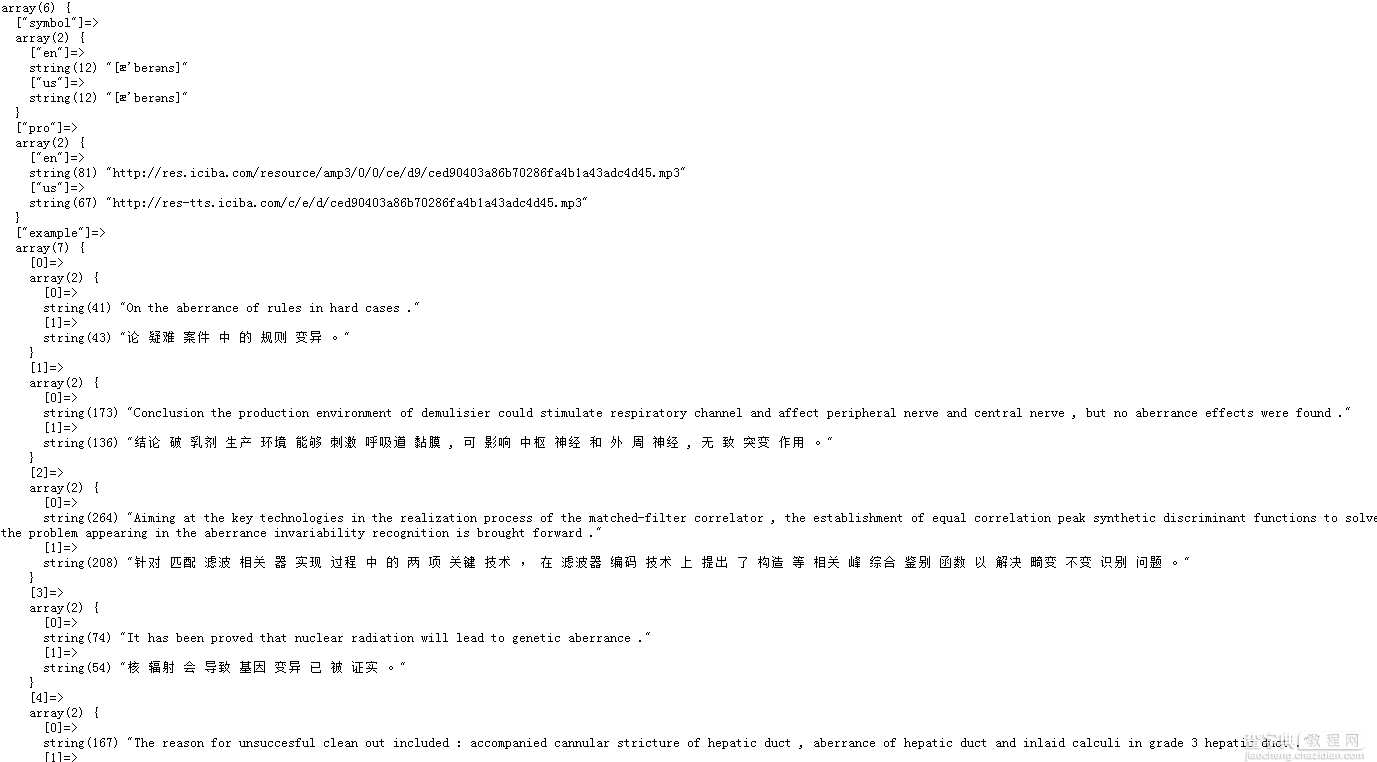
百度dict 采集样本
写的采集百度dict词典翻译后的所有结果数据,当然附带了13.5w单词库和采集简单的案例,这里我把写出的主要类dict.class.php放出来,项目地址http://github.com/widuu/baidu_dict,有需要的直接fork就可以了~么么哒,这东西用的人很少,所以有用的兄弟拿走了哈~
<?php /** * dict.class.php 采集百度词典翻译内容 * * @copyright (C) 2014 widuu * @license http://www.widuu.com * @lastmodify 2014-2-15 */ header("content-type:text/html;charset=utf8"); class Dict{ private $word; //显示的条数 private static $num = 10; public function __construct(){} /** * 公用返回百度采集数据的方法 * @param string 英文单词 * retun array( * symbol" => 音标 * "pro" => 发音 * "example"=> 例句 * "explain"=> 简明释义 * "synonym"=> 同反义词 * "phrase" => 短语数组 * ) * */ public function content($word){ $this -> word = $word; $symbol = $this -> Pronounced(); $pro = $this->getSay(); $example = $this -> getExample(); $explain = $this -> getExplain(); $synonym = $this -> getSynonym(); $phrase = $this -> getPhrase(); $result = array( "symbol" => $symbol, //音标 "pro" => $pro, //发音 "example"=> $example, //例句 "explain"=> $explain, //简明释义 "synonym"=> $synonym, //同反义词 "phrase" => $phrase //短语数组 ); return $result; } /** * 远程获取百度翻译内容 * get function curl * retun string * */ private function getContent(){ $useragent = "Mozilla/5.0 (Windows NT 6.1; WOW64; rv:23.0) Gecko/20100101 Firefox/23.0"; $ch = curl_init(); $url = "http://dict.baidu.com/s".$this->word; curl_setopt($ch, CURLOPT_URL, $url); curl_setopt($ch, CURLOPT_USERAGENT,$useragent); curl_setopt($ch, CURLOPT_RETURNTRANSFER, TRUE); curl_setopt($ch, CURLOPT_FOLLOWLOCATION, 1); curl_setopt($ch, CURLOPT_HTTPGET, 1); curl_setopt($ch, CURLOPT_AUTOREFERER,1); curl_setopt($ch, CURLOPT_HEADER, 0); curl_setopt($ch, CURLOPT_TIMEOUT, 30); $result = curl_exec($ch); if (curl_errno($curl)) { echo 'Errno'.curl_error($curl); } curl_close($ch); return $result; } /** * 获取百度翻译发音 * retun array(英,美) * */ private function Pronounced(){ $data = $this -> getContent(); preg_match_all("/"EN-US">(.*)</b>/Ui",$data,$pronounced); return array( 'en' => $pronounced[1][0], 'us' => $pronounced[1][1] ); } /** * 获取百度翻译发音 * return array(英,美) * */ private function getSay(){ $data = $this -> getContent(); preg_match_all("/url="(.*)"/Ui",$data,$pronounced); return array( 'en' => $pronounced[1][0], 'us' => $pronounced[1][1] ); } /** * 获取百度翻译例句 * return array() 多维数组 例句 * */ private function getExample(){ $str = ""; $data = $this -> getContent(); preg_match_all("/var example_data = (.*)];/Us",$data,$example); $data1 = "[[[".ltrim($example[1][0],"["); $data2 = explode("[[[",$data1); $num = count(array_filter($data2)); foreach($data2 as $key => $value){ $data3 = explode("[[","[[".$value); foreach ($data3 as $k => $v) { preg_match_all("/["(.*)",/Us","[".$v, $match); if(!empty($match[1])){ $str .= implode($match[1]," ")."@"; } } } $data4 = trim($str,"@"); $data5 = explode("@", $data4); $result = array_chunk($data5, 2); return $result; } /** * 获取简明释义 * return array (x => "词性",b => "附属") * **/ private function getExplain(){ $data = $this -> getContent(); preg_match_all("/id="en-simple-means">(.*)<div(s+)class="source">/Us",$data,$explain); $r_data = $explain[1][0]; preg_match_all("/<p><strong>(?P<adj>.*)</strong><span>(?P<name>.*)</span></p>/Us", $r_data, $a_data); preg_match_all("/<span>(?P<tag>[^>]+):<a(s+)href="(.*)">(?P<word>.*)</a></span>/Us", $r_data, $b_data); $result = array(); foreach ($a_data["adj"] as $key => $value) { $result[$value] = $a_data["name"][$key]; } $word_b = array(); foreach ($b_data["tag"] as $key => $value) { $word_b[$value] = strip_tags($b_data["word"][$key]); } $result_data = array("x" => $result,"b" => $word_b); return $result_data; } /** * 获取同义词 * return array(0 => "同义词", 1 => "反义词") 一般为多维数组 * */ private function getSynonym(){ $data = $this -> getContent(); preg_match_all("/id="en-syn-ant">(.*)<div(s+)class="source">/Us",$data,$synonym); $content = $synonym[1][0]; $data1 = explode("</dl>", $content); $result = array(); $data2 = array(); foreach ($data1 as $key => $value) { preg_match_all("/<strong>(?P<adj>.*) </strong></div><div(s+)class="syn-ant-list"><ul>(?<content>.*)</ul>/Us", $value, $r_data); $data2[$key]["adj"] = $r_data["adj"]; $data2[$key]["content"] = $r_data["content"]; } foreach ($data2 as $key => $value) { foreach ($value["content"] as $k => $v) { if(!empty($v)){ preg_match_all("/<li><p>(?P<title>.*)</p>(?P<value>.*)</li>/Us", $v, $v_data); foreach ($v_data['title'] as $m => $d) { $data = strip_tags(preg_replace("<</a>>"," ", $v_data["value"][$m])); $result[$key][$value["adj"][$k]][$d] = $data; } } } } return $result; } /** * 获取短语词组 * return array (key => value) 一维或者多维数组 * */ private function getPhrase(){ $num = self::$num; $data = $this -> getContent(); preg_match_all("/id="en-phrase">(.*)<div>/Us",$data,$phrase); $data = explode("</dd>",$phrase[1][0]); $data1 = array_slice($data,0,$num); $result = array(); foreach ($data1 as $key => $value) { $data2 = explode("</p>", $value); $n = count($data2); if($n<=3){ $result[str_replace("","",strip_tags($data2[0]))] = strip_tags($data2[1]); }else{ $data3 = array_slice($data2,0,$n-1); $data4 = array_slice($data2,0,2); $res = array_diff($data3,$data4); $data5 = array_chunk($res,2); $key_value = trim(str_replace("","",strip_tags($data4[0]))); $result[$key_value] = strip_tags($data4[1]); foreach ($data5 as $key => $value) { foreach ($value as $k => $v) { $value[$k] = strip_tags($v); } $array = array($result[$key_value],$value); if (array_key_exists($key_value, $result)){ $result[$key_value] = $array; } } } } return $result; } /** * 将数组转换为字符串 * * @param array $data 数组 * @param bool $isformdata 如果为0,则不使用new_stripslashes处理,可选参数,默认为1 * @return string 返回字符串,如果,data为空,则返回空 */ private function array2string($data, $isformdata = 1) { if($data == '') return ''; if($isformdata) $data = $this->new_stripslashes($data); return addslashes(var_export($data, TRUE)); } /** * 返回经stripslashes处理过的字符串或数组 * @param $string 需要处理的字符串或数组 * @return mixed */ private function new_stripslashes($string) { if(!is_array($string)) return stripslashes($string); foreach($string as $key => $val) $string[$key] = $this->new_stripslashes($val); return $string; } } // $word = new dict("express"); // $word ->content();
以上就是本文的全部内容了,非常实用的功能,希望小伙伴们能够喜欢。


